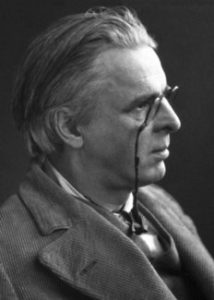The Lake Isle of Innisfree
By William Butler Yeats
About the Poet

Image Reference: nobelprize.org
William Butler Yeats was born in 1865 at Sandy mount in County Dublin, Ireland. He was educated in London. His interest in poetry developed at an early age due to his fascination in the Irish legends. He was a versatile writer and wrote his poetry in many forms. He received the Noble Prize in Literature in the year 1923. He died in 1939 at the age of 73.
The Lake Isle of Innisfree
I will arise and go now, and go to Innisfree,
And a small cabin build there, of clay and wattles made:
Nine bean-rows will I have there, a hive for the honeybee,
And live alone in the bee-loud glade.
And I shall have some peace there, for peace comes dropping slow
Dropping from the veils of the morning to where the cricket sings;
There midnight’s all a glimmer, and noon a purple glow,
And evenings full of the linnet’s wings.
I will arise and go now, for always night and day
I hear the lake water lapping with low sounds by the shore;
While I stand on the roadway, or on the pavements grey,
I hear it in the deep heart’s core.
Meanings of Difficult Words
Wattles: twisted sticks for making fences, walls
Glade: clearing; open space
Linnet: a small brown and grey bird with a short beak
Theme
This poem is a longing one feels for some peace and solitude after living in a crowded and congested place like a city.
Summary
The poet tells the readers that he will arise and go to Innisfree Lake. There he will build a small cabin of clay and wattles. He will plant some beans in nine rows and tend the honey bees in a hive. He will live alone in that place, with the buzzing of the bees all around him.
The poet gives the reason of his visiting Innisfree. He says that he will go there to find some peace and solitude. He describes magical qualities of the different times of day and the unbroken solitude and peace he will achieve there.
The speaker shakes himself out of his daydream. Once again he says that he is going to leave for the Innisfree and stay there day and night, reinforcing its importance in his life. He hears the lake water lapping with low sounds by the shore. While he stands in the city on the roadway. He hears the sound only within himself.
Setting
Innisfree is a small island on the lake Lough Gill, in County Sligo. It is a place near the coast of Ireland. W. B. Yeats spent his childhood holidays in the County Silgo and came to love the place dearly. The poem can be said to be Yeat’s longing for his return to the quiet place of his childhood.
The setting of the poem is on the shores of the lake isle of Innisfree. The first two stanzas continue with this setting but in the third stanza, the setting changes to that in a city with roadways and pavements.
Poetic Devices
This poem is one of William Butler Yeats’ most celebrated poems. The poem consists of 12 lines and an abab cdcd efef rhyme scheme.
Imagery: There is a fair amount of imagery in this poem. We can see the images of small cabin of clay and wattles, nine bean-rows, a hive for the honeybee, the slowly dawning sky, the peaceful crickets’ song, the shimmery glimmer midnight, the purple sky in the noon and finally the beating of the small linnet birds’ wings.
Repetition: The first line of first stanza and the first line of third stanza start the same way with the sentence, “I will arise and go now”.
Alliteration: There is alliteration, repeating of the same consonant sounds, in line 2 of stanza 3: lake water lapping with low sounds…
Metaphor: Line 2 of stanza 2. ‘Veils of morning’ refers to the fog or dew one often experiences in ‘green’ places.
Short and Long Answer Type Questions
Q. Look at the words the poet uses to describe what he sees and hears at Innisfree.
(a) Bee-loud glade
Ans. The glade (small clearing in a forest) is filled with the buzzing sound of the bees.
(b) Evenings full of the linnet’s wings
Ans. These words presents the image of linnets flying across an evening sky.
(c) Lake water lapping with low sounds
Ans. These words evoke not only the image but also the soft sound of a lake’s water washing the shore.
Q. What kind of place is Innisfree?
Ans. Innisfree is a small beautiful island on the lake Lough Gill, in County Sligo. It is a place near the coast of Ireland.
Q. What are the three things the poet wants to do when he goes back there?
Ans. The poet wants to build a small cabin with clay and wattles, plant some beans in nine rows and tend the honey bees in a hive. He wants to live there alone with the buzzing of the bees all around him.
Q. What does he hear and see there? What is its effect on him?
Ans. He hears the crickets’ song and sees the afternoon with purple glow, the linnets flying in the evening and the glimmering midnight. He finds peace and tranquility there.
Q. What does he hear in his “heart’s core” even when he is far away from Innisfree?
Ans. Even when he is far away from Innisfree, he hears the sound of the lake water lapping with low sounds by the shore in his heart’s core.
Q. By now you may have concluded that Innisfree is a simple, natural place, full of beauty and peace. How does the poet contrast it with where he now stands?
Ans. The poet contrasts the simple, natural and peaceful Innisfree to the crowded and congested urban area. The poet describes the natural beauty of Innisfree by using the phrases like ‘purple glow’, ‘glimmer’, ‘cricket sings’ and ‘bee-loud glade’. On the other hand, he describes the place where he now stands, i.e. the roadways or pavements, as “grey”, lacking beauty and peace.
Q. What do the following words mean to you? What do you think “comes dropping slow…from the veils of the morning”? What does the phrase “to where the cricket sings” mean?
………………………………………..peace comes dropping slow
Dropping from the veils of the morning to where the cricket sings;
Ans. These lines indicate that peace of mind can be slowly acquired from the natural surroundings. It is peace that “comes dropping slow…from the veils of the morning”. The phrase “to where the cricket sings” means a peaceful place where one can hear the vibrant sounds of nature such as the songs of the crickets at the time of dawn.
Q. Do you think Innisfree is only a place, or a state of mind? Does the poet actually miss the place of his boyhood days?
Ans. Innisfree represents his state of mind. The poet wishes to escape to Innisfree as it is more beautiful and peaceful than the city he lives in. Yes, the poet actually misses the place of his boyhood days. Even when he is away from Innisfree, he recalls the sound of the lake water washing the shore.
——–xxXxx——–
